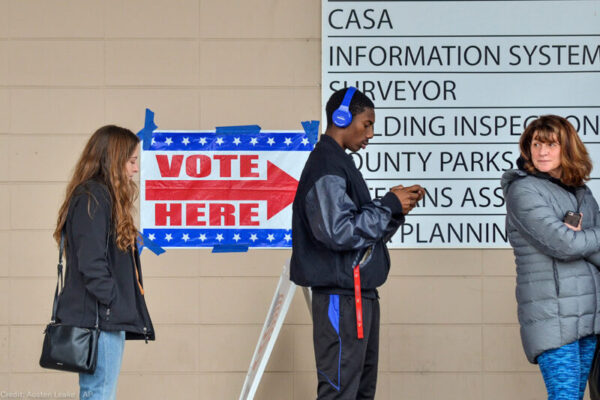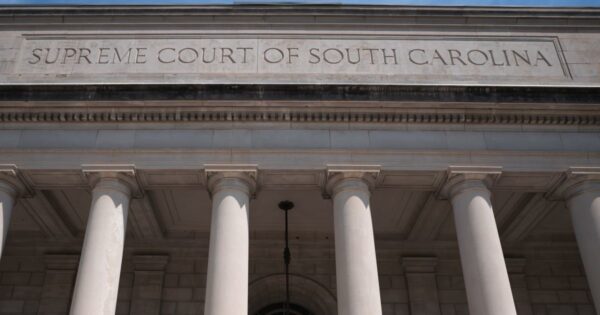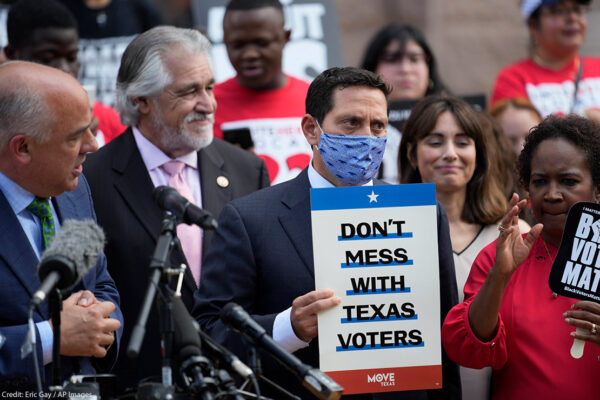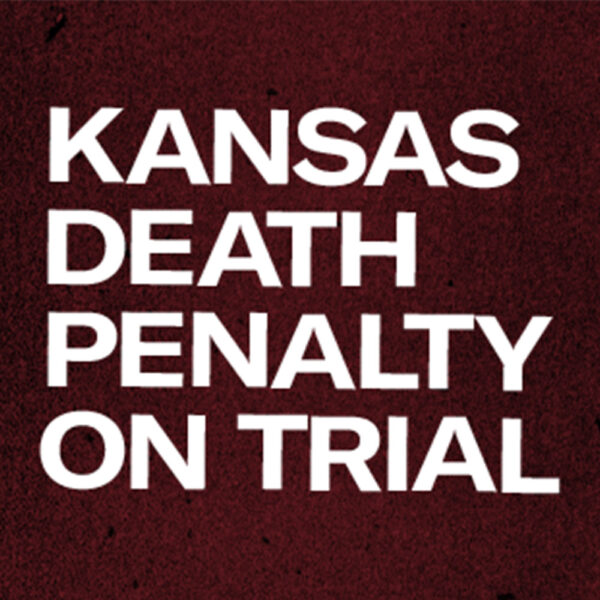Supreme Court Term 2024-2025
WeÔÇÖre breaking down the cases we've asked the court to consider this term.
Latest Case Updates
Ongoing
Updated June 13, 2025
Closed (Judgment)
Updated June 6, 2025
Ongoing
Updated May 8, 2025
Ongoing
Updated March 24, 2025
Featured
Georgia Supreme Court
Jun 2025

Voting Rights
Eternal Vigilance Action, Inc. v. Georgia
The ╠ăđ─Vlogand partner organizations intervened in this case to represent the rights of voters and voting-rights organizations in a case challenging a number of rules passed by the Georgia State Election Board. We challenged the rule requiring that the number of votes cast be hand counted at the polling place prior to the tabulation of votes. In a critical victory for Georgia voters, in June 2025, the Georgia Supreme Court upheld a lower courtÔÇÖs decision permanently blocking the rule requiring hand counting of ballots at polling places before tabulation ÔÇö a process widely criticized for risking delays, ballot spoliation, and voter disenfranchisement.
U.S. Supreme Court
May 2025

Voting Rights
Racial Justice
Allen v. Milligan
Whether AlabamaÔÇÖs congressional districts violate Section 2 of the Voting Rights Act because they discriminate against Black voters. We succeeded in winning a new map for 2024 elections which, for the first time, has two congressional district that provide Black voters a fair opportunity to elect candidates of their choosing despite multiple attempts by Alabama to stop us at the Supreme Court. Despite this win, Alabama is still defending its discriminatory map, and a trial was held in February 2025 to determine the map for the rest of the decade.
In May 2025, a federal court ruled that Alabama's 2023 congressional map both violates Section 2 of the Voting Rights Act and was enacted by the Alabama Legislature with racially discriminatory intent.
Washington, D.C.
Apr 2025

Voting Rights
League of Women Voters Education Fund v. Trump
On March 25, 2025, in a sweeping and unprecedented Executive Order, President Trump attempted to usurp the power to regulate federal elections from Congress and the States. Among other things, the Executive Order directs the Election Assistance CommissionÔÇöan agency that Congress specifically established to be bipartisan and independentÔÇöto require voters to show a passport or other citizenship documentation in order to register to vote in federal elections. If implemented, the Executive Order would threaten the ability of millions of eligible Americans to register and vote and upend the administration of federal elections.
On behalf of leading voter registration organizations and advocacy organizations, the ╠ăđ─Vlogand co-counsel filed a lawsuit to block the Executive Order as an unconstitutional power grab.
Maryland
Apr 2025

Religious Liberty
LGBTQ Rights
Mahmoud v. Taylor
On April 9, 2025, the ╠ăđ─Vlogand ╠ăđ─Vlogof Maryland filed an amicus brief with the U.S. Supreme Court supporting the Montgomery County Public Schools (MCPS) in its efforts to ensure that its English Language Arts curriculum is LGBTQ-inclusive.
U.S. Supreme Court
Mar 2025

Voting Rights
Callais v. Landry
Whether the congressional map Louisiana adopted to cure a Voting Rights Act violation in Robinson v. Ardoin is itself unlawful as a gerrymander.
New Hampshire
Mar 2025

Voting Rights
Coalition for Open Democracy v. Scanlan
This lawsuit challenges HB 1569, a new law that will make New Hampshire the only state to require every person to produce documentary proof of citizenship when they register to vote for both state and federal elections. It also challenges HB 1569ÔÇÖs elimination a preexisting protection for votersÔÇönamely, an affidavit option that allowed voters who faced surprise challenges to their eligibility at the polls to swear to their qualifications and cast a ballot. Accordingly, HB 1569 violates the First and Fourteenth Amendments of the U.S. Constitution by placing substantial burdens on New Hampshirites at all stages of the voting process, and will arbitrarily disenfranchise hundreds, if not thousands of qualified voters.
South Carolina Supreme Court
Jan 2025

Voting Rights
League of Women Voters of South Carolina v. Alexander
This case involves a state constitutional challenge to South CarolinaÔÇÖs 2022 congressional redistricting plan, which legislators admit was drawn to entrench a 6-1 Republican majority in the stateÔÇÖs federal delegation. Plaintiff the League of Women Voters of South Carolina has asked the stateÔÇÖs Supreme Court to conclude that the congressional map is an unlawful partisan gerrymander that violates the state constitution.
Texas
Oct 2024

Voting Rights
OCA-Greater Houston v. Paxton
Texas has growing Hispanic and Black populations that helped propel record voter turnout in the November 2020 election. The Texas Legislature responded to this increased civic participation with an omnibus election bill titled Senate Bill 1ÔÇöSB 1 for shortÔÇöthat targeted election practices that made voting more accessible to traditionally marginalized voters like voters of color, voters with disabilities, and voters with limited English proficiency. Since 2021, SB 1 has resulted in tens of thousands of lawful votes being rejected, and it remains a threat to democracy in Texas.
Ohio
Sep 2024

Reproductive Freedom
Planned Parenthood Southwest Ohio Region et al., v. Ohio Department of Health, et al.
The ╠ăđ─Vlog, the ╠ăđ─Vlogof Ohio, Planned Parenthood Federation of America, the law firm WilmerHale, and Fanon Rucker of the Cochran Law Firm, on behalf of Planned Parenthood Southwest Ohio Region, Planned Parenthood of Greater Ohio, Preterm-Cleveland, WomenÔÇÖs Med Group Professional Corporation, Dr. Sharon Liner, and Julia Quinn, MSN, BSN, amended a complaint in an existing lawsuit against a ban on telehealth medication abortion services to bring new claims under the Ohio Reproductive Freedom Amendment, including additional challenges to other laws in Ohio that restrict access to medication abortion in the state.
All Cases
1,584 Court Cases

Washington, D.C.
Feb 2024
National Security
Human Rights
╠ăđ─Vlogv. DOD ÔÇô FOIA Case Seeking Biden AdministrationÔÇÖs Presidential Policy Memorandum
In October 2022, the Biden administration confirmed the existence of the White HouseÔÇÖs latest set of policy rules governing the United StatesÔÇÖ use of lethal force outside of recognized battlefields abroad. These new rules are known as the ÔÇťPresidential Policy Memorandum (PPM).ÔÇŁ The administration made the partially-redacted PPM public in response to the latest in a series of ╠ăđ─Vloglawsuits to force transparency about the U.S. governmentÔÇÖs secretive, unlawful, and controversial use of lethal force abroad, including through the use of drones.
Explore case
Washington, D.C.
Feb 2024

National Security
Human Rights
╠ăđ─Vlogv. DOD ÔÇô FOIA Case Seeking Biden AdministrationÔÇÖs Presidential Policy Memorandum
In October 2022, the Biden administration confirmed the existence of the White HouseÔÇÖs latest set of policy rules governing the United StatesÔÇÖ use of lethal force outside of recognized battlefields abroad. These new rules are known as the ÔÇťPresidential Policy Memorandum (PPM).ÔÇŁ The administration made the partially-redacted PPM public in response to the latest in a series of ╠ăđ─Vloglawsuits to force transparency about the U.S. governmentÔÇÖs secretive, unlawful, and controversial use of lethal force abroad, including through the use of drones.

Kansas
Feb 2024
Capital Punishment
Kansas v. Kyle Young
If the death penalty is racist, arbitrary and serves no valid penological purpose, does it violate the Kansas Constitution?
The ACLU, together with the ╠ăđ─Vlogof Kansas and law firm Hogan Lovells US LLP, challenged the Kansas death penalty statute under the Kansas Constitution and United States Constitution in the case of Kansas v. Kyle Young. Mr. Young is a Black man who faced a capital trial in Sedgwick County, Kansas. Prosecutors sought a death sentence. The Sedgwick County District Court held an unprecedented evidentiary hearing in February 2023.
Explore case
Kansas
Feb 2024

Capital Punishment
Kansas v. Kyle Young
If the death penalty is racist, arbitrary and serves no valid penological purpose, does it violate the Kansas Constitution?
The ACLU, together with the ╠ăđ─Vlogof Kansas and law firm Hogan Lovells US LLP, challenged the Kansas death penalty statute under the Kansas Constitution and United States Constitution in the case of Kansas v. Kyle Young. Mr. Young is a Black man who faced a capital trial in Sedgwick County, Kansas. Prosecutors sought a death sentence. The Sedgwick County District Court held an unprecedented evidentiary hearing in February 2023.

Pennsylvania Supreme Court
Feb 2024
Privacy & Technology
Free Speech
Commonwealth v. Kurtz
ÔÇťReverse searchesÔÇŁ are a novel surveillance technique where the police can obtain records reflecting everyone who used a search engine to look up a particular word or phrase. In this case, the lower court approved the police using a reverse search, ruling that people do not have a reasonable expectation of privacy for any query they enter into a search engine. The ACLUÔÇÖs Speech, Privacy, and Technology Project and State Supreme Court Initiative along with the ╠ăđ─Vlogof Pennsylvania filed an amicus brief in the Pennsylvania Supreme Court urging the court to reverse the lower courtÔÇÖs decision and hold that search history data is protected by the state and federal Constitution.
Explore case
Pennsylvania Supreme Court
Feb 2024

Privacy & Technology
Free Speech
Commonwealth v. Kurtz
ÔÇťReverse searchesÔÇŁ are a novel surveillance technique where the police can obtain records reflecting everyone who used a search engine to look up a particular word or phrase. In this case, the lower court approved the police using a reverse search, ruling that people do not have a reasonable expectation of privacy for any query they enter into a search engine. The ACLUÔÇÖs Speech, Privacy, and Technology Project and State Supreme Court Initiative along with the ╠ăđ─Vlogof Pennsylvania filed an amicus brief in the Pennsylvania Supreme Court urging the court to reverse the lower courtÔÇÖs decision and hold that search history data is protected by the state and federal Constitution.

Virginia Supreme Court
Feb 2024
Criminal Law Reform
Board of Supervisors of Fairfax County v. Leach-Lewis
In this case, the Virginia Supreme Court is considering whether the U.S. Constitution and/or the Virginia Constitution require the exclusionary ruleÔÇöwhich protects people from unconstitutional searches and seizuresÔÇöto apply in civil zoning enforcement actions. The Institute for Justice, along with The ╠ăđ─Vlogof Virginia and the Speech, Privacy, and Technology Project and the State Supreme Court Initiative at the ACLU, submitted an amicus brief arguing that the exclusionary rule should apply in civil actions to protect VirginiansÔÇÖ search and seizure rights.
Explore case
Virginia Supreme Court
Feb 2024

Criminal Law Reform
Board of Supervisors of Fairfax County v. Leach-Lewis
In this case, the Virginia Supreme Court is considering whether the U.S. Constitution and/or the Virginia Constitution require the exclusionary ruleÔÇöwhich protects people from unconstitutional searches and seizuresÔÇöto apply in civil zoning enforcement actions. The Institute for Justice, along with The ╠ăđ─Vlogof Virginia and the Speech, Privacy, and Technology Project and the State Supreme Court Initiative at the ACLU, submitted an amicus brief arguing that the exclusionary rule should apply in civil actions to protect VirginiansÔÇÖ search and seizure rights.

Iowa
Feb 2024
Criminal Law Reform
Racial Justice
State of Iowa v. Lawrence George Canady III
In this case, the Iowa Supreme Court considered when rap lyrics are admissible evidence in criminal trials. The State sought further review of a court of appeals decision which reversed the defendant's criminal convictions and remanded for a trial based on errors in the admission of evidence. Together with the Speech, Privacy, and Technology Project and the ╠ăđ─Vlogof Iowa, the State Supreme Court Initiative filed an amicus brief arguing that such evidence should usually be excluded because it is rarely probative and yet creates a high risk of prejudice to the defendant. The Iowa Supreme Court ultimately reversed the Court of Appeals decision, but for narrow and fact-specific reasons. And the Iowa Supreme Court acknowledged that, in cases not involving the peculiar facts of Canady's case, other courts had expressed concerns about the risk that a jury will unfairly use rap lyrics and music as evidence of a defendant's guilt.
Explore case
Iowa
Feb 2024

Criminal Law Reform
Racial Justice
State of Iowa v. Lawrence George Canady III
In this case, the Iowa Supreme Court considered when rap lyrics are admissible evidence in criminal trials. The State sought further review of a court of appeals decision which reversed the defendant's criminal convictions and remanded for a trial based on errors in the admission of evidence. Together with the Speech, Privacy, and Technology Project and the ╠ăđ─Vlogof Iowa, the State Supreme Court Initiative filed an amicus brief arguing that such evidence should usually be excluded because it is rarely probative and yet creates a high risk of prejudice to the defendant. The Iowa Supreme Court ultimately reversed the Court of Appeals decision, but for narrow and fact-specific reasons. And the Iowa Supreme Court acknowledged that, in cases not involving the peculiar facts of Canady's case, other courts had expressed concerns about the risk that a jury will unfairly use rap lyrics and music as evidence of a defendant's guilt.
